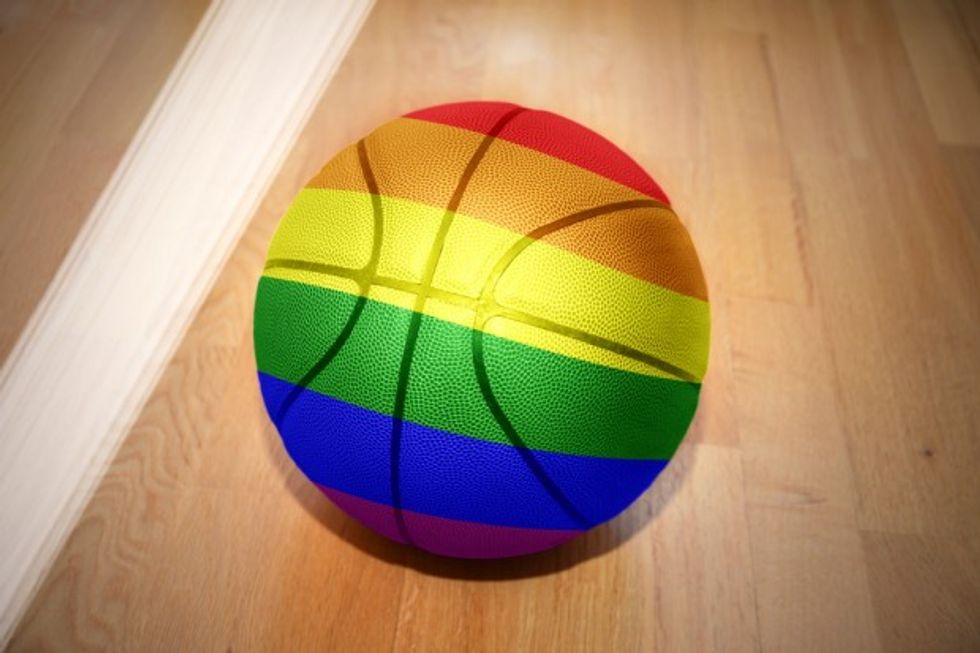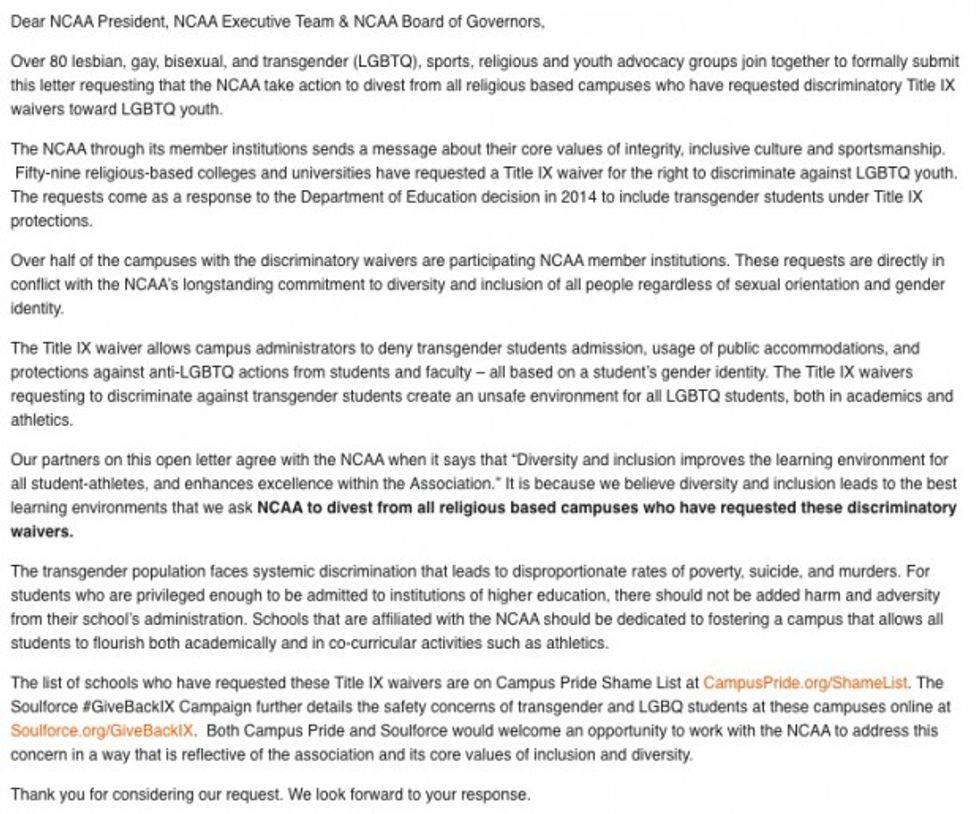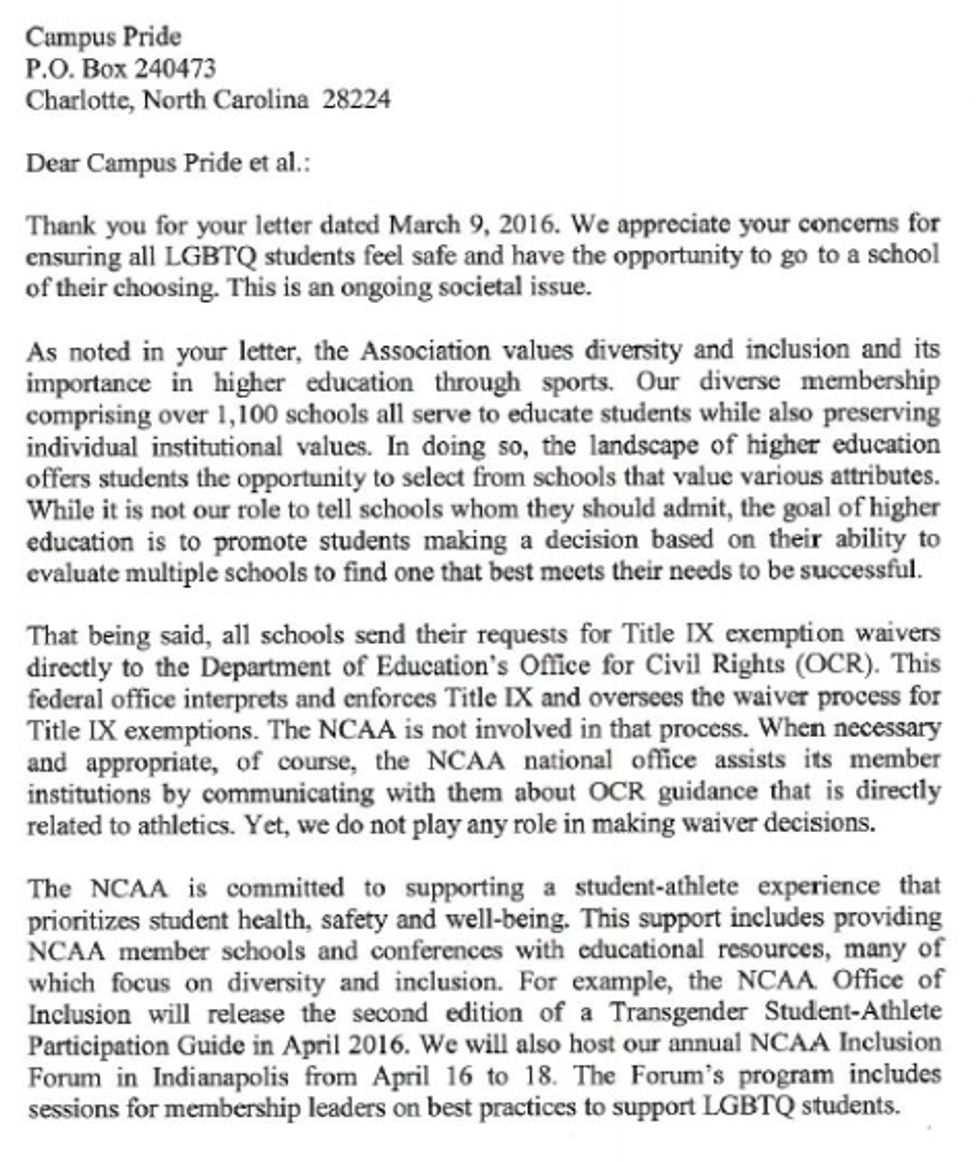
Photo credit: Shutterstock

A coalition of more than 80 gay rights groups are expressing profound frustration after unsuccessfully demanding that the National Collegiate Athletic Association divest from "religious-based campuses" that have "requested discriminatory Title IX waivers toward LGBTQ youth."
"The NCAA through its member institutions sends a message about their core values of integrity, inclusive culture and sportsmanship," read a March 9 letter from Campus Pride, an pro-LGBTQ rights organization, to the NCAA sports authority. "Fifty-nine religious-based colleges and universities have requested a Title IX waiver for the right to discriminate against LGBTQ youth."
The letter said that the requests by these religious schools — which reportedly increased in prevalence after the Department of Education included transgender protections under Title IX in 2014 — stand in conflict with the NCAA's commitment to diversity, specifically when it comes to LGBTQ rights, and went on to fully explain activists' grievances.

Protections under Title IX of the Education Amendments of 1972 prevent discrimination based on sex in education and sports programs that receive federal money, though religious schools have been able to ask for exemptions when they believe that the application of the law would be inconsistent with their values, as the New York Times has reported.
Title IX reads, "No person in the United States shall, on the basis of sex, be excluded from participation in, be denied the benefits of, or be subjected to discrimination under any education program or activity receiving Federal financial assistance."

It is with these facts in mind that Campus Pride is pushing back against schools that have requested religious-based waivers.
"The Title IX waiver allows campus administrators to deny transgender students admission, usage of public accommodations, and protections against anti-LGBTQ actions from students and faculty – all based on a student’s gender identity," the group's letter read. "The Title IX waivers requesting to discriminate against transgender students create an unsafe environment for all LGBTQ students, both in academics and athletics."
The central goal of the letter was to ask the NCAA, which governs athletics at more than 1,100 schools across the nation, to divest and pull support from Christian or religious institutions that have made these requests for waivers.
"Schools that are affiliated with the NCAA should be dedicated to fostering a campus that allows all students to flourish both academically and in co-curricular activities such as athletics," the letter read.
But in a March 17 statement, Campus Pride — which also maintains a so-called "Shame List" of schools that have requested exemptions "based on anti-LGBTQ religion-based bigotry" — expressed disappointment with the written response that the organization received from the NCAA, with the sports authority defending the rights of religious schools to hold traditional values.
"Our diverse membership comprising over 1,100 schools all serve to educate students while preserving individual institutional values," the response letter read, in part. "In doing so, the landscape of higher education offers students the opportunity to select from schools that value various attributes."
The text continued, "While it is not our role to tell schools whom they should admit, the goal of higher education is to promote students making a decision based on their ability to evaluate multiple schools to find one that best meets their needs to be successful."
The NCAA went on to note that it is the Department of Education that makes waiver decisions and that the NCAA is not involved in that process, though the sports authority does sometimes offer guidance to member schools.

The letter sparked a strong collective response from Shane Windmeyer, executive director of Campus Pride and Haven Herrin, executive director of Soulforce — a faith-based activist group, as the two leaders said that they are profoundly disappointed in the NCAA.
"We are deeply disappointed by the lack of leadership and responsibility demonstrated in the response to our letter. The NCAA is an organization with a stated commitment to fairness and inclusion of LGBTQ student athletes," they said in a joint statement. "Claiming that the Department of Education is to blame for the NCAA’s inability to divest from discriminatory member institutions, instead of owning up to their complicity, is not the kind of leadership we should expect from the NCAA."
Windmeyer and Herrin continued, "We expect the NCAA to be honest that these religious schools are flouting the NCAA’s own core values."
As TheBlaze previously reported, questions almost immediately began emerging last June after the Supreme Court legalized gay marriage, with many religious freedom advocates wondering how the ruling would impact Christian and faith-based colleges and universities.
Barry W. Lynn, executive director of Americans United for Separation of Church and State, a First Amendment watchdog, told the Christian Post in July 2015 that the time has come to have a discussion about educational institutions that discriminate based on sexuality.
“I think that the issue with [LGBT] rights is a little bit different [from race]. The evolution of the issue is moving at least as quickly as we have moved in the area of race and that this is a national dialogue that ought to begin about, should in fact benefits be given to educational institutions that do in fact discriminate,” Lynn told the outlet. “Even now, I would not want to be a person at a fundamentalist academy who is trying to defend the practice, that is taking a reasonable amount of government funds and refusing to allow a same-sex married couple to live in the married student housing. I think even now, that would be on the edge of the indefensible.”
Read more about the issue of Christian colleges navigating gay rights here.
--
Front page image via Shutterstock.com.
--
Follow the author of this story on Twitter and Facebook:
Billy Hallowell